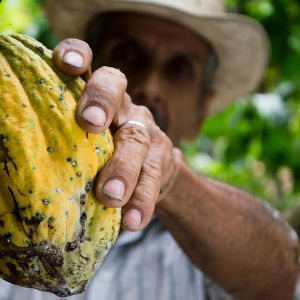
This paper reviews the effects of voluntary sustainability standards - such as Fairtrade, organic and Rainforest Alliance - in the food supply chain, discussing several different crops. It argues that while standards can improve production sustainability in some circumstances, they are not alone sufficient to make the whole food system sustainable.
The paper reports that only 2% of the world’s farmland area is covered by a certification scheme, with organic certification covering the largest area. Sustainability standards are important for certain crops, for example 27-44% of cocoa is estimated to be certified under a sustainability standard.
The paper gives an overview of empirical findings on the environmental, social and economic effects of sustainability standards. The results vary highly depending on - among other things - the crops, regions and standards in question. For example, while organic certification in Uganda has been reported to increase the revenue of cocoa farmers, organic–Fairtrade double certification of coffee farmers in the same country has no effect on net income, because higher prices for the crops are cancelled out by reduced land and labour productivity.
The authors also identify five questions for further research:
- Does the literature capture causal effects of standards? In other words, are observed differences between certified and non-certified farms caused by the standards, or do pre-existing differences influence the uptake of standards?
- Are poor farmers excluded from sustainability standards, for example due to high entry barriers or the strategic choices of businesses?
- How can enforcement and compliance be ensured, particularly when working with many farmers?
- How can price premiums be maintained as supply increases above demand for certified products? It is estimated that 30-70% of the certified production volume is not actually sold as certified.
- Should we expect continued proliferation of standards, particularly as most growth in food demand in the near future will be from low- and middle-income countries?
Abstract
Agrifood supply chains contribute to many environmental and social problems. Sustainability standards—rules that supply chain actors may follow to demonstrate their commitment to social equity and/or environmental protection—aim to mitigate such problems. We provide a narrative review of the effects of many distinct sustainability standards on different supply chain actors spanning multiple crops. Furthermore, we discuss five emerging questions—causality, exclusion, compliance and monitoring, excess supply and emerging country markets—and identify directions for future research. We find that, while sustainability standards can help improve the sustainability of production processes in certain situations, they are insufficient to ensure food system sustainability at scale, nor do they advance equity objectives in agrifood supply chains.
Reference
Meemken, E.M., Barrett, C.B., Michelson, H.C., Qaim, M., Reardon, T. and Sellare, J., 2021. Sustainability standards in global agrifood supply chains. Nature Food, pp.1-8.
Read the full paper here. See also the TABLE explainer How can we reduce food-related greenhouse gas emissions?







Post a new comment »